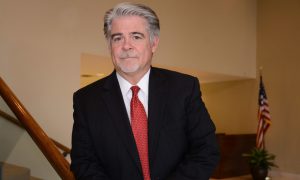'Some People Are Just Diabolical': Florida Judges Get Candid About Being 'Goaded'
South Florida judges provide a rare glimpse into what it's like to preside over emotional and contentious cases while keeping a cool head.
February 28, 2020 at 10:00 AM
9 minute read
The original version of this story was published on Daily Business Review
 South Florida judges open up about the stress of the robe. Photo: Andrey_Popov/Shutterstock.com.
South Florida judges open up about the stress of the robe. Photo: Andrey_Popov/Shutterstock.com.
When Brevard Circuit Judge Robin Lemonidis was publicly reprimanded for losing her temper in trial, and using a sentencing colloquy to tell a defendant she hoped he'd have to fight for his life in prison, former Miami-Dade Circuit Judge Ronald Dresnick felt a pang of sympathy.
"I felt pretty sorry for the judge involved, because I've been there and I know how easy it is to say something which would be viewed as inappropriate, just because your emotions are boiling," Dresnick said.
Dresnick—now a partner at Kluger, Kaplan, Silverman, Katzen & Levine in Miami—said he tried not to use gavels after once banging his down so hard in a murder case that it broke.
"There are so many times you say something, and as you're saying it, you wish you could grab those words and bring them back," Dresnick said. "But you can't."
'Mentally exhausted'
 Broward Circuit Judge Dennis Bailey. Photo: Melanie Bell/ALM.
Broward Circuit Judge Dennis Bailey. Photo: Melanie Bell/ALM.Broward Circuit Judge Dennis Bailey can relate.
He was reprimanded in 2019 for losing his temper in a felony criminal trial—something he feels happened because he underestimated the personal toll it would take to handle four death penalty cases in two years—two of which came back-to-back.
Midway through one murder case, Bailey said he'd promised the husband of a murdered woman, frustrated by years of delay, that he'd get to that trial immediately after it.
But in hindsight, that was a mistake.
"I was mentally exhausted at the conclusion of those cases and did not handle situations as well as I should have," Bailey said. "I learned from that lesson and would never do that again."
Bailey said he's found that taking time to decompress after difficult and emotional cases is crucial.
"When you're having a case that you know every word is going to be analyzed and every ruling is going to be taken up on appeal, such as a death penalty case, you're on the edge of your seat all day, every day. And if the trial goes on for two, three weeks, that's where the stress builds up," Bailey said. "Don't let yourself linger in the hot seat, so to speak. Take a break, go back and do the research, and make sure you're comfortable with your decision, instead of just shooting from the hip."
A recent study by the American Bar Association's Commission on Lawyers Assistance Programs revealed that Dresnick and Bailey are far from alone, as many jurists reported experiencing high blood pressure, insomnia, stress and other health issues. The National Center for State Courts' judicial stress resource guide has also pinpointed connections between budget cuts and low morale, obesity and judicial stress.
And it's no surprise, given the high stakes. Presiding over a criminal case, for instance, could mean taking away someone's life and liberty, while civil litigation could ruin a business, and a family case might separate parents from their children.
Related story: Burnout on the Bench: Judges Grapple With Stress, Fatigue
Trying to get judges recused
Wearing a black robe means being tested all the time—and rightly so, since judges sit on the bench to deliver justice.
 Ronald Dresnick of Kluger Kaplan Silverman Katzen & Levine. Courtesy photo.
Ronald Dresnick of Kluger Kaplan Silverman Katzen & Levine. Courtesy photo.But sometimes, in Dresnick's experience, wearing the robe also means being "goaded" by lawyers.
"It took me four, five years just to learn how to cope with attorneys. I've seen attorneys try to just take a judge off just by doing some really outrageous things, and trying to get the judge to lose their temper so they can get that judge recused," Dresnick said. "It happens all the time, and some people are just diabolical in the way they act, just to get the judge to make a mistake like that."
Where sentencing's concerned, the best practice is not to comment on the crime at all.
"If you sentence somebody to life, what else do you have to say?" Dresnick said. "You don't need to show how much power you have. In fact, by not saying anything, you're probably demonstrating more what your power is, than when you do say something."
'I've just signed your death warrant'
That issue arose from comments Ingham Circuit Judge Rosemarie Aquilina made during the Michigan sentencing hearing of former USA Gymnastics doctor Larry Nassar, convicted of sexually abusing dozens of girls.
The judge's words provoked uproar from Nassar's attorneys.
Before handing down the prison sentence, Aquilina told Nassar, "I wouldn't send my dogs to you, sir," calling him evil and remarking, "I've just signed your death warrant."
Nassar's attorneys claimed the judge's comments were biased and led to a prison attack on Nassar.
Miami-Dade Circuit Judge Nushin Sayfie, who also serves on the Florida Bar's mental health and wellness committee, says case law shows judges tend to get in trouble when they inject their opinions into sentencing.
 Miami-Dade Circuit Judge Nushin G. Sayfie. Photo: J. Albert Diaz/ALM.
Miami-Dade Circuit Judge Nushin G. Sayfie. Photo: J. Albert Diaz/ALM."The best practices are really just to state the sentence and move on," Sayfie said.
The most isolating aspect of judicial life, in Sayfie's view, comes when rulings are misunderstood or taken out of context, either because it wasn't appropriate for the judge to elaborate, or because the media didn't properly explain in its reporting.
This could lead judges to agonize over how best to present a decision.
"Unfortunately, the hard part is the next day, getting ripped apart in the newspaper, in the media, by comments in the Miami Herald," Sayfie said. "The best way that I get through moments like that is by sharing with my colleagues. I think here in Miami, because we're such a big circuit, the good news is we have a lot of support among our colleagues who understand."
Mental health support
The Florida Bar is working on providing free and confidential online therapy sessions for all bar members, Sayfie said.
"It's important for judges and lawyers to feel that if they're having a mental health issue, or if they're facing a time in their lives where there's more stress than others, [that] it's OK. It's normal, and it's acceptable to ask for help," Sayfie said. "It's acceptable to get support, and they shouldn't fear repercussions from the court and their colleagues."
 Broward Circuit Chief Judge Jack Tuter. Photo: J. Albert Diaz
Broward Circuit Chief Judge Jack Tuter. Photo: J. Albert DiazChief Broward Circuit Judge Jack Tuter noted that judges not only have to make important and impartial decisions but also deal with daily emergencies that crop up in already-heavy dockets. He urged judges to seek relief through the Florida Judicial Wellness Program.
"Judges are taught to leave the bench, or take a break if faced with a particularly difficult situation. This will help the judge regain his/her thoughts, and hopefully prevent saying something in haste," Tuter said. "Because it is such an isolated occupation, judges frequently call on each other to discuss and deal with stressful situations and cases."
For Bailey, DUI manslaughter cases are heart wrenching, particularly when a child has been killed, as the defendant is frequently not "a bad person."
"It's hard sometimes for a judge to keep a dry eye, when you hear the victim's pain and anguish when they address the person who killed their child, [describe] how much they've destroyed their lives, and you hear the family of the person who's being sentenced," Bailey said. "Their loved one is now going off to prison for however many years, and they've done anything wrong in their life."
In addition to judicial conferences and training sessions, which teach judges to recognize what triggers them and to take a recess when it happens, Dresnick says visiting other judge's courtrooms is invaluable.
"You see somebody who's a good judge, and you watch the way they handle a situation you were in. And you might hear them and say, 'That's really interesting, I'm going to try that,' but nobody seems to have enough time," Dresnick said.
Though the judicial canons say judges must avoid even the appearance of impropriety, not showing enough humanity can be harmful too, according to Dresnick. He said Judge Lance Ito's handling of O.J. Simpson's infamous murder trial is a good example.
"He just went out of his way not to say anything at all. He was trying so hard to maintain a certain stoicism that I thought was not helpful. Judges aren't computers, and they really shouldn't be," Dresnick said. "I don't like to just see this robotic reaction to things. I like the human factor, but I think the judges that are expressing the human factor need to be cognizant of the way it's going to read in tomorrow's DBR."
Read more:
Straight Talk About a Judicial 'Dirty Secret': Chief Justice Calls for Mental Health Measures
This content has been archived. It is available through our partners, LexisNexis® and Bloomberg Law.
To view this content, please continue to their sites.
Not a Lexis Subscriber?
Subscribe Now
Not a Bloomberg Law Subscriber?
Subscribe Now
NOT FOR REPRINT
© 2025 ALM Global, LLC, All Rights Reserved. Request academic re-use from www.copyright.com. All other uses, submit a request to [email protected]. For more information visit Asset & Logo Licensing.
You Might Like
View All
New York Court of Appeals Blocks Trump Attempt to Stay Friday Sentencing

Tesla, Musk Appeal Chancery Compensation Case to Delaware Supreme Court
2 minute read
'Self-Diagnosed Nickel Allergy' Fails to Find Success in Med-Mal Suit, 8th Circuit Rules
5 minute read
TikTok Hit With California Class Action for Allegedly Mining Children's Data Without Parental Consent
Law Firms Mentioned
Trending Stories
Who Got The Work
Michael G. Bongiorno, Andrew Scott Dulberg and Elizabeth E. Driscoll from Wilmer Cutler Pickering Hale and Dorr have stepped in to represent Symbotic Inc., an A.I.-enabled technology platform that focuses on increasing supply chain efficiency, and other defendants in a pending shareholder derivative lawsuit. The case, filed Oct. 2 in Massachusetts District Court by the Brown Law Firm on behalf of Stephen Austen, accuses certain officers and directors of misleading investors in regard to Symbotic's potential for margin growth by failing to disclose that the company was not equipped to timely deploy its systems or manage expenses through project delays. The case, assigned to U.S. District Judge Nathaniel M. Gorton, is 1:24-cv-12522, Austen v. Cohen et al.
Who Got The Work
Edmund Polubinski and Marie Killmond of Davis Polk & Wardwell have entered appearances for data platform software development company MongoDB and other defendants in a pending shareholder derivative lawsuit. The action, filed Oct. 7 in New York Southern District Court by the Brown Law Firm, accuses the company's directors and/or officers of falsely expressing confidence in the company’s restructuring of its sales incentive plan and downplaying the severity of decreases in its upfront commitments. The case is 1:24-cv-07594, Roy v. Ittycheria et al.
Who Got The Work
Amy O. Bruchs and Kurt F. Ellison of Michael Best & Friedrich have entered appearances for Epic Systems Corp. in a pending employment discrimination lawsuit. The suit was filed Sept. 7 in Wisconsin Western District Court by Levine Eisberner LLC and Siri & Glimstad on behalf of a project manager who claims that he was wrongfully terminated after applying for a religious exemption to the defendant's COVID-19 vaccine mandate. The case, assigned to U.S. Magistrate Judge Anita Marie Boor, is 3:24-cv-00630, Secker, Nathan v. Epic Systems Corporation.
Who Got The Work
David X. Sullivan, Thomas J. Finn and Gregory A. Hall from McCarter & English have entered appearances for Sunrun Installation Services in a pending civil rights lawsuit. The complaint was filed Sept. 4 in Connecticut District Court by attorney Robert M. Berke on behalf of former employee George Edward Steins, who was arrested and charged with employing an unregistered home improvement salesperson. The complaint alleges that had Sunrun informed the Connecticut Department of Consumer Protection that the plaintiff's employment had ended in 2017 and that he no longer held Sunrun's home improvement contractor license, he would not have been hit with charges, which were dismissed in May 2024. The case, assigned to U.S. District Judge Jeffrey A. Meyer, is 3:24-cv-01423, Steins v. Sunrun, Inc. et al.
Who Got The Work
Greenberg Traurig shareholder Joshua L. Raskin has entered an appearance for boohoo.com UK Ltd. in a pending patent infringement lawsuit. The suit, filed Sept. 3 in Texas Eastern District Court by Rozier Hardt McDonough on behalf of Alto Dynamics, asserts five patents related to an online shopping platform. The case, assigned to U.S. District Judge Rodney Gilstrap, is 2:24-cv-00719, Alto Dynamics, LLC v. boohoo.com UK Limited.
Featured Firms
Law Offices of Gary Martin Hays & Associates, P.C.
(470) 294-1674
Law Offices of Mark E. Salomone
(857) 444-6468
Smith & Hassler
(713) 739-1250








